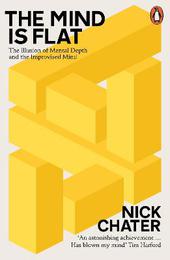
|
The Mind is Flat: The Illusion of Mental Depth and The Improvised Mind
Paperback / softback
Main Details
| Title |
The Mind is Flat: The Illusion of Mental Depth and The Improvised Mind
|
| Authors and Contributors |
By (author) Nick Chater
|
| Physical Properties |
| Format:Paperback / softback | | Pages:272 | | Dimensions(mm): Height 198,Width 129 |
|
| Category/Genre | Popular psychology |
|---|
| ISBN/Barcode |
9780241208779
|
| Classifications | Dewey:158.1 |
|---|
| Audience | |
|---|
|
Publishing Details |
| Publisher |
Penguin Books Ltd
|
| Imprint |
Penguin Books Ltd
|
| Publication Date |
28 March 2019 |
| Publication Country |
United Kingdom
|
Description
A radical reinterpretation of how your mind works - and why it could change your life We all like to think we have a hidden inner life. Most of us assume that our beliefs and desires arise from the murky depths of our minds, and, if only we could work out how to access this mysterious world, we could truly understand ourselves. In The Mind Is Flat, pre-eminent behavioural scientist Nick Chater reveals that this entire enterprise is utterly misguided. Drawing on startling new research in neuroscience, behavioural psychology and perception, he shows that we have no hidden depths to plumb, and unconscious thought is a myth. Instead, we generate our ideas, motives and thoughts in the moment. As the reader discovers, through mind-bending visual examples and counterintuitive experiments, we are all characters of our own creation, constantly improvising our behaviour based on our past experiences. And, as Chater shows us, recognising this can be liberating.
Author Biography
Nick Chater is Professor of Behavioural Science at Warwick Business School. He founded WBS's Behavioural Science group, which is the largest of its kind in Europe, advises the UK's Behavioural Insights Team and was scientist-in-residence on the BBC Radio 4 series The Human Zoo. He is a member of the UK Committee on Climate Change, and a Fellow of the Cognitive Science Society and the British Academy.
ReviewsAn astonishing achievement. Nick Chater has blown my mind - as well as assuring me that my brain just doesn't work the way I think it does. I haven't been able to stop talking about the ideas in this book -- Tim Harford * author of Fifty Things That Made the Modern Economy and The Undercover Economist * A superb exposition of scientific findings -- Steven Poole * Guardian * It's a triumph in itself that Chater has written a book about cognition that is as gripping as a thriller. In fact, I would go even further. If you can measure a book by how often you find yourself bringing it up in conversation, then The Mind is Flat is one of the best I've ever read . . . Brilliant . . . beautifully written . . . you'll be able to bored your relatives rigid with your new theories of cognition over the Christmas turkey -- Thomas W. Hodgkinson * The Spectator * This is a remarkable book. Every other book about the mind will tell you either why we're so dumb, or why we're so smart. Chater offers a single elegant theory to explain both: why our minds so often let us down and confound us, at the same time that they far surpass our current attempts to build intelligence in machines -- Josh Tenenbaum, Professor of Cognitive Science and Computation at MIT The mind may be flat but this book is a fascinating, rounded and radical approach to understanding how we think and act. The implications for understanding human decision making are profound. Everyone who enjoyed Thinking, Fast and Slow must read this book -- Gus O'Donnell, former Cabinet Secretary and Chair of the Behavioural Insights Team Advisory Board A total assault on all lingering psychiatric and psychoanalytic notions of mental depths to be plumbed. For Chater, surface is everything ... Light the touchpaper and stand well back -- 'The ideas driving 2018' * New Scientist * Launched with what may be the most engaging prologue of any work of nonfiction, the reader of The Mind is Flat is taken on a fascinating intellectual journey. Chater first compels us to leave behind widely-accepted views about the depth of the mind, abandoning the cherished idea that thinking is rooted in the depths of unconscious thought. But far from depriving the life of the mind of its charm, magic or meaning, Chater introduces us to a new appreciation of the brain's remarkable propensity and capacity to make sense of experience. While the mind may indeed be flat in the sense it is devoid of unconscious ruminations, reading this book leaves us with a much deeper, transformed, understanding of our own thoughts and feelings and of how we perceive the definitively non-flat world in which we live -- George Loewenstein * author of Exotic Preferences: Behavioral Economics and Human Motivation *
|